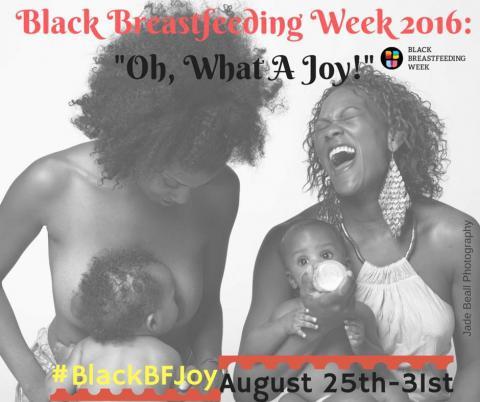
More Than Just Talking Equity: Why Black Breastfeeding Week is Central to Achieving Equity #BlackBFJoy
Lately there’s been a lot of talk in the public health and breastfeeding circles about equity. And rightly so. The scope and depth of racial disparities across various health indicators and in breastfeeding—life’s earliest health intervention—cannot be ignored. Yet every year, many in these same circles, both publicly and privately question why Black Breastfeeding Week is necessary.
To be clear, ever since our inaugural year, the co-founders of Black Breastfeeding Week (including myself) decided that we did not have to explain why we need a Black Breastfeeding Week—as respected advocates with long standing track records in our community we have a right to self-determine what initiatives might help our community. We don’t need permission.
However, as a communicator and a dot-connector, I’m compelled to share why Black Breastfeeding Week is such a critical part of any attempts at creating equity in the breastfeeding movement. To start, many people confuse equality with equity. These are two different things—one can be a function of sheer mathematics as in, there are an equal number of schools in each neighborhood. The other is about the experience—schools in one neighborhood don’t have books, arts classes or after school funding.
My favorite illustration comes from my brilliant comrade, Simran Noor of the Center for Social Inclusion. Simran often uses the very-relatable experience of using the ladies’ room at any sports or concert event—anywhere. Ever. What happens? The line for the Ladies’ room is long and winding down the corridor while the men are zipping in and out and barely missing the KissCam. Now every stadium most likely has an equal number of Men’s rooms and Ladies rooms. Therefore, there is technically, equality. But the experience is not equitable. Women are spending twice the time on lines that are twice as long. We miss out on the shows we’ve paid good money for because of an equal biological need that stadium designers can’t turn into an equitable experience. We can debate the whys and how’s of restroom logistics all day long, but to make the lived experience actually equitable, there may need to be more ladies’ rooms than men’s room. One would have to move beyond thinking about what is equal to a nuanced understanding of what makes it equitable. Yes, sometimes you have to do more, build more, give more, create more-- just to achieve equity. Equity requires thoughtful intention, not mere number comparisons. This is why Black Breastfeeding Week is central to creating a more equitable breastfeeding landscape because it is a part of building the more to compensate for when there has been less or when equal is not good enough.
Last week, when I was speaking at the Indiana Perinatal Conference we were faced with this same unequitable Ladies room experience at break time. The long lines threatened to impact our time learning from the amazing sessions and quite frankly, I was the next speaker. Realizing that something needed to be done quickly to change the experience, women took matters into their own hands, creating equity by commandeering the men’s room next door which was not being used at the time. There was a look out person and a back-up. Women saw a need and quickly filled it. There were no silly questions about why women were adding another bathroom when there was already a bathroom there. Nobody said it was anti-men to temporarily attempt to increase the opportunities for women. And if long lines are enough to justify immediate and concerted efforts, there should be no need to explain when sick babies, dead babies, predatory practices and systemic racism impacting the level of professional support received, spark action. And nobody was asked to explain why all of this extra effort was necessary—the need was blatantly obvious.
I think you know where I’m going with this. The need for Black Breastfeeding Week is also blatantly obvious. Forty years of racial disparities in breastfeeding rates and too many years of racial disparities in infant mortality rates tell us so. The high prevalence of “first food deserts” and the need for more First Food Friendly Communities in black and brown neighborhoods are also key indicators. However, if we continue to think BBW is simply about empowerment and not a critical mechanism for creating equity then we are all missing the point. BBW is like building those extra ladies rooms, by women who saw a need and took action to make sure that some of us are not zipping in and out and others are on long, frustrating lines and completely missing the very important show.
The show that can positively impact the health trajectory of every African American infant and improve the health outcomes of mothers everywhere.
The show that creates a new narrative for empowerment and resiliency.
The show that disrupts the simplistic language of equality and chooses something bolder and more impactful --equity.
And I am honored that Kiddada, Anayah and I have a front seat now, and for what we hope to be, Equity’s opening act. That’s the show I will happily stand in line for.
In motherhood,
Kimberly


The views and opinions expressed in this post are those of the author(s) and do not necessarily reflect those of MomsRising.org.
MomsRising.org strongly encourages our readers to post comments in response to blog posts. We value diversity of opinions and perspectives. Our goals for this space are to be educational, thought-provoking, and respectful. So we actively moderate comments and we reserve the right to edit or remove comments that undermine these goals. Thanks!